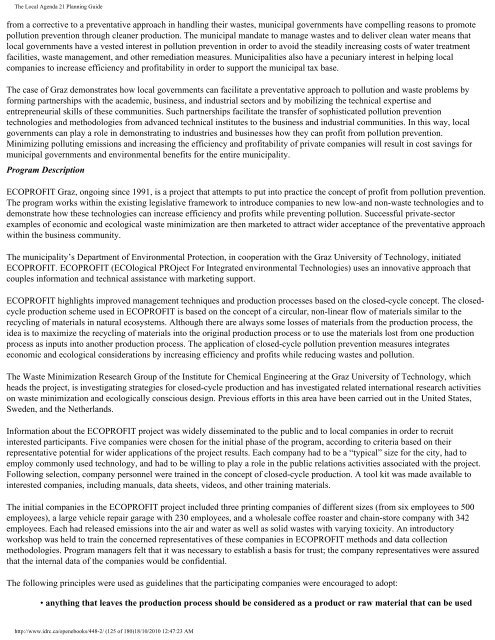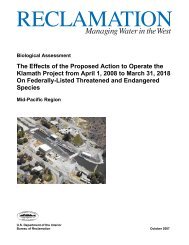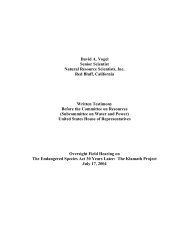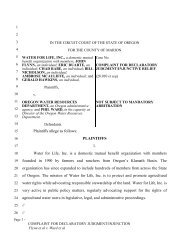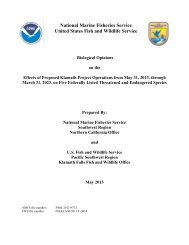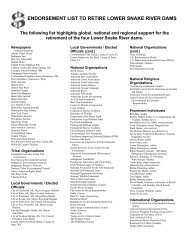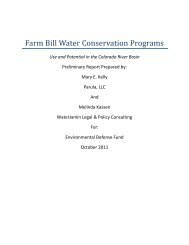The Local Agenda 21 Planning Guide - Democrats Against UN ...
The Local Agenda 21 Planning Guide - Democrats Against UN ...
The Local Agenda 21 Planning Guide - Democrats Against UN ...
You also want an ePaper? Increase the reach of your titles
YUMPU automatically turns print PDFs into web optimized ePapers that Google loves.
<strong>The</strong> <strong>Local</strong> <strong>Agenda</strong> <strong>21</strong> <strong>Planning</strong> <strong>Guide</strong><br />
from a corrective to a preventative approach in handling their wastes, municipal governments have compelling reasons to promote<br />
pollution prevention through cleaner production. <strong>The</strong> municipal mandate to manage wastes and to deliver clean water means that<br />
local governments have a vested interest in pollution prevention in order to avoid the steadily increasing costs of water treatment<br />
facilities, waste management, and other remediation measures. Municipalities also have a pecuniary interest in helping local<br />
companies to increase efficiency and profitability in order to support the municipal tax base.<br />
<strong>The</strong> case of Graz demonstrates how local governments can facilitate a preventative approach to pollution and waste problems by<br />
forming partnerships with the academic, business, and industrial sectors and by mobilizing the technical expertise and<br />
entrepreneurial skills of these communities. Such partnerships facilitate the transfer of sophisticated pollution prevention<br />
technologies and methodologies from advanced technical institutes to the business and industrial communities. In this way, local<br />
governments can play a role in demonstrating to industries and businesses how they can profit from pollution prevention.<br />
Minimizing polluting emissions and increasing the efficiency and profitability of private companies will result in cost savings for<br />
municipal governments and environmental benefits for the entire municipality.<br />
Program Description<br />
ECOPROFIT Graz, ongoing since 1991, is a project that attempts to put into practice the concept of profit from pollution prevention.<br />
<strong>The</strong> program works within the existing legislative framework to introduce companies to new low-and non-waste technologies and to<br />
demonstrate how these technologies can increase efficiency and profits while preventing pollution. Successful private-sector<br />
examples of economic and ecological waste minimization are then marketed to attract wider acceptance of the preventative approach<br />
within the business community.<br />
<strong>The</strong> municipality’s Department of Environmental Protection, in cooperation with the Graz University of Technology, initiated<br />
ECOPROFIT. ECOPROFIT (ECOlogical PROject For Integrated environmental Technologies) uses an innovative approach that<br />
couples information and technical assistance with marketing support.<br />
ECOPROFIT highlights improved management techniques and production processes based on the closed-cycle concept. <strong>The</strong> closedcycle<br />
production scheme used in ECOPROFIT is based on the concept of a circular, non-linear flow of materials similar to the<br />
recycling of materials in natural ecosystems. Although there are always some losses of materials from the production process, the<br />
idea is to maximize the recycling of materials into the original production process or to use the materials lost from one production<br />
process as inputs into another production process. <strong>The</strong> application of closed-cycle pollution prevention measures integrates<br />
economic and ecological considerations by increasing efficiency and profits while reducing wastes and pollution.<br />
<strong>The</strong> Waste Minimization Research Group of the Institute for Chemical Engineering at the Graz University of Technology, which<br />
heads the project, is investigating strategies for closed-cycle production and has investigated related international research activities<br />
on waste minimization and ecologically conscious design. Previous efforts in this area have been carried out in the United States,<br />
Sweden, and the Netherlands.<br />
Information about the ECOPROFIT project was widely disseminated to the public and to local companies in order to recruit<br />
interested participants. Five companies were chosen for the initial phase of the program, according to criteria based on their<br />
representative potential for wider applications of the project results. Each company had to be a “typical” size for the city, had to<br />
employ commonly used technology, and had to be willing to play a role in the public relations activities associated with the project.<br />
Following selection, company personnel were trained in the concept of closed-cycle production. A tool kit was made available to<br />
interested companies, including manuals, data sheets, videos, and other training materials.<br />
<strong>The</strong> initial companies in the ECOPROFIT project included three printing companies of different sizes (from six employees to 500<br />
employees), a large vehicle repair garage with 230 employees, and a wholesale coffee roaster and chain-store company with 342<br />
employees. Each had released emissions into the air and water as well as solid wastes with varying toxicity. An introductory<br />
workshop was held to train the concerned representatives of these companies in ECOPROFIT methods and data collection<br />
methodologies. Program managers felt that it was necessary to establish a basis for trust; the company representatives were assured<br />
that the internal data of the companies would be confidential.<br />
<strong>The</strong> following principles were used as guidelines that the participating companies were encouraged to adopt:<br />
• anything that leaves the production process should be considered as a product or raw material that can be used<br />
http://www.idrc.ca/openebooks/448-2/ (125 of 180)18/10/2010 12:47:23 AM


